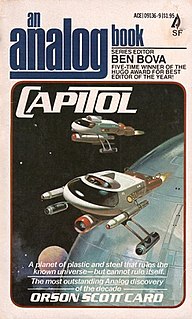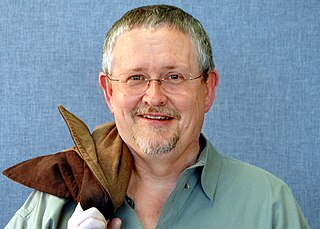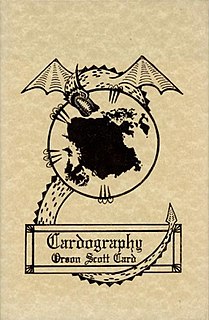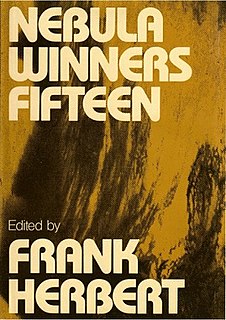
Capitol (1979) was Orson Scott Card's second published book, and first foray into science fiction. This collection of eleven short stories set in the Worthing series is no longer in print. However six of the stories have been reprinted in The Worthing Saga (1990) and one of them in Maps in a Mirror (1990).

The Folk of the Fringe (1989) is a collection of post-apocalyptic stories by American writer Orson Scott Card. These stories are set sometime in the near future, when World War III has left America in ruins. The stories are about how a few groups of Mormons struggle to survive. Although all of these stories in this book were meant to stand alone, they each include at least one character from one of the other stories which helps to make them a cohesive collection.

The Worthing Chronicle (1983) is a science fiction novel by American writer Orson Scott Card, part of The Worthing series. This book by itself is out of print having been published along with nine short stories in the collection The Worthing Saga (1990).

The Worthing Saga (1990) is a science fiction book by American writer Orson Scott Card, set in the Worthing series. It is made up of the novel The Worthing Chronicle (1982) and nine related stories. Six of the stories are from Card's short story collection Capitol (1979) and the other three are early works, two of them previously unpublished.

Maps in a Mirror (1990) is a collection of short stories by American writer Orson Scott Card. Like Card's novels, most of the stories have a science fiction or fantasy theme. Some of the stories, such as "Ender's Game", "Lost Boys", and "Mikal's Songbird" were later expanded into novels. Each of the smaller volumes that make up the larger collection as a whole are centered on a theme or genre. For instance, Volume 1, The Changed Man, reprints several of Card's horror stories. The collection won the Locus Award in 1991.

InterGalactic Medicine Show was an American online fantasy and science fiction magazine. It was founded in 2005 by multiple award-winning author Orson Scott Card and was edited by Edmund R. Schubert from 2006–2016, after which Scott Roberts took over. It was originally biannual, but became quarterly in 2008 and bimonthly in 2009, except for a brief hiatus in 2010. The magazine ceased publication in June 2019.
"I Put My Blue Genes On" is a science fiction short story by American writer Orson Scott Card, first published in the August 1978 issue of Analog. It also appears in his short story collections Unaccompanied Sonata and Other Stories and Maps in a Mirror.

Orson Scott Card is an American writer known best for his science fiction works. He is currently the only person to win both a Hugo Award and a Nebula Award in consecutive years, winning both awards for both his novel Ender's Game (1985) and its sequel Speaker for the Dead (1986) back-to-back. A feature film adaptation of Ender's Game, which Card co-produced, was released in 2013. Card also wrote the Locus Fantasy Award-winning series The Tales of Alvin Maker (1987–2003).
The Orson Scott Card bibliography contains a list of works published by Orson Scott Card.

Cardography (1987) is a short story collection by American writer Orson Scott Card. It contains five stories and an introduction by David G. Hartwell. All five of these stories were later published in Maps in a Mirror.
"In the Doghouse" is a science fiction short story by American writers Orson Scott Card and Jay A. Parry. It appears in his short story collection Maps in a Mirror. Card originally published this story in the December 1978 issue of Analog Science Fiction and Fact.
"The Monkeys Thought 'Twas All in Fun" is a short story by Orson Scott Card. It appears in his short story collections Unaccompanied Sonata and Other Stories and Maps in a Mirror.
"Unaccompanied Sonata" is a short story by American writer Orson Scott Card, first published in the March, 1979 issue of Omni magazine. It appears in his short story collections Unaccompanied Sonata and Other Stories and Maps in a Mirror. It was nominated in 1979 for the Nebula Award for Best Short Story and in 1980 for the Hugo Award for Best Short Story.
"Lifeloop" is a science fiction short story by American writer Orson Scott Card. It appears in his short story collections Capitol and The Worthing Saga. Card first published it in the October 1978 issue of Analog Science Fiction and Fact.
"Breaking the Game" is a short story by American writer Orson Scott Card. It appears in his short story collections Capitol and The Worthing Saga. Card first published it in the January 1979 issue of Analog Science Fiction and Fact.
"Killing Children" is a short story by Orson Scott Card. It appears in his short story collections Capitol and The Worthing Saga. Card first published it in the November 1978 issue of Analog Science Fiction and Fact.
"When No One Remembers His Name, Does God Retire?" is a science fiction short story by American writer Orson Scott Card. It only appears in his short story collection Capitol.
"Ender's Game" is a science fiction novelette by American writer Orson Scott Card. It first appeared in the August 1977 issue of Analog magazine and was later expanded into the 1985 novel Ender's Game. Although the foundation of the Ender's Game series, the novelette is not properly part of the Ender's Game universe, as there are many discrepancies in continuity.

The 1980 Annual World's Best SF is an anthology of science fiction short stories edited by Donald A. Wollheim and Arthur W. Saha, the ninth volume in a series of nineteen. It was first published in paperback by DAW Books in May 1980, followed by a hardcover edition issued in September of the same year by the same publisher as a selection of the Science Fiction Book Club. For the hardcover edition the original cover art of Jack Gaughan was replaced by a new cover painting by Gary Viskupik. The paperback edition was later reissued by DAW under the variant title Wollheim's World's Best SF: Series Nine.

Nebula Winners Fifteen is an anthology of award winning science fiction short works edited by Frank Herbert. It was first published in hardcover by Harper & Row in April 1981. The first British edition was published in hardcover by W. H. Allen in April 1982. Paperback editions followed from Star in the U.K. in January 1983 and Bantam Books in the U.S. in March 1983.
This page is based on this
Wikipedia article Text is available under the
CC BY-SA 4.0 license; additional terms may apply.
Images, videos and audio are available under their respective licenses.










